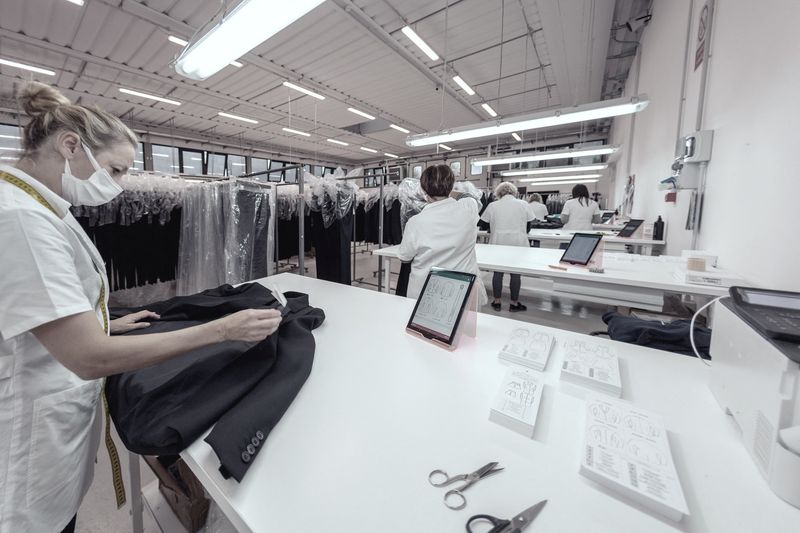By Elisa Anzolin and Valentina Za
MILAN (Reuters) - Italian businesses discovered the limits of their 'small is beautiful' motto when competition became global. Nudged by private equity funds, those supplying the booming luxury goods industry are now finding strength in unity.
With its tradition of sophisticated craftsmanship, Italy is home to thousands of small manufacturers that cover 50-55% of the global production of luxury clothing and leather goods, consultancy Bain calculates, against 20-25% for the rest of Europe.
Largely family-owned and small in size, these businesses often struggle to meet the changing needs of the luxury brands they work for.
To address luxury shoppers' growing sustainability concerns while also securing timely deliveries, brands are looking to establish close ties with suppliers, who in turn require hefty investments to track where they source materials and build an adequate digital backbone.
Private equity funds, after running out of big brands to buy, have now locked on to the challenges of the luxury industry's supply chain and turned to a "buy and build" strategy.
"Luxury brands have been growing exponentially: our customers needed us to grow with them," said Nicola Giuntini, whose Tuscany-based company makes luxury coats and jackets for brands including Celine, Burberry and Stella McCartney.
The Giuntinis in 2020 sold their company to VAM Investments - controlled by former Bulgari Chief Executive Francesco Trapani - and two other Italian investment firms when they became part of a hub of luxury clothing manufacturers.
"Working together we can guarantee stable production levels and undertake projects that would otherwise be too costly," said Giuntini.
ADVANTAGE ITALY
Private equity has had a big say in the shaping of Italy's fashion industry. It accounts for 40% of transactions over the past decade or so, including the buyouts of Moncler, Versace, Roberto Cavalli and Ermenegildo Zegna, KPMG research showed.
The COVID-19 pandemic, with its aftermath of supply chain disruption, has been central in convincing Italian baby-boomer business owners that the time was right to let outsiders into their closely held companies.
The Giuntini business is now part of Gruppo Florence, a hub owned by the funds and the families that sold their businesses and reinvested part of the proceeds.
The group currently includes 22 companies with combined revenue of more than 500 million euros ($542.00 million) and aims to get to 30 before looking at a possible initial public offering.
Meanwhile it has started working with Bank of America (NYSE:BAC) and Citi to assess strategic options after drawing interest from investment firms including Carlyle and Permira, two people close to the matter said. All interested parties declined to comment.
"There are no listed assets that give investors exposure to the luxury sector's made-in-Italy supply chain," VAM CEO Marco Piana told Reuters.
"This is one of the few sectors where being Italian is a competitive advantage: there is no other geography where you have the same know-how when it comes to manufacturing soft luxury products."
Luciano Barbetta, whose clothing company in southern Italy joined Gruppo Florence last year, said hubs can help producers to make up for delays in deliveries of raw materials.
"There being several companies we can help one another fulfil orders right on schedule. And it feels good to know all the weight is not just on your shoulders," Barbetta said.
PRODUCTION NICHES
Italy's manufacturing sector has also been a hunting ground for big luxury brands keen to secure their supply chain.
Private equity investors and fashion majors could potentially be competitors, but KPMG Partner Stefano Cervo pointed to supply chain niches that are a good fit for funds and less appealing to luxury conglomerates.
"For a big brand it makes sense to buy, say, a tannery specialising in rare leather but I struggle to imagine they'd be interested, for example, in the makers of golden coating for handbag chains or buttons," he said.
"Yet there is value to be created in bringing together golden coating makers. Just from a sustainability perspective, scale makes it easier to recycle production waste or reduce the carbon footprint."
Italian private equity firm XENON International, for example, has bet on producers of materials and finishes for luxury items which it has grouped together in MinervaHub.
The seven companies in its portfolio, which include makers of metal accessories or specialising in surface finishes, have aggregate sales of 180 million euros which MinervaHub wants to grow to 300 million as it scrutinises another six companies.
MinervaHub provides support to its businesses on legal and financial matters as well as environmental, social and governance (ESG), said XENON Founding Partner and Managing Director Franco Prestigiacomo.
That is vital in an industry which KPMG's Cervo says has become "obsessed" with ESG.
"Suppliers can pose a major reputational risk for brands," VAM's Piana said.
"In the world of social media it's too dangerous not to have full visibility on your supply chain."
($1 = 0.9225 euros)
